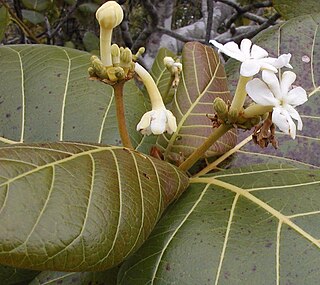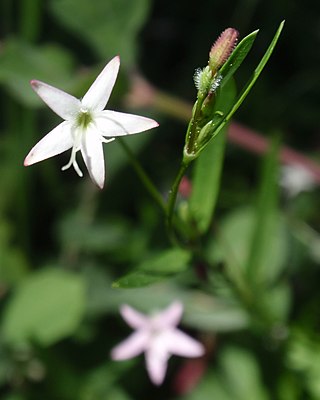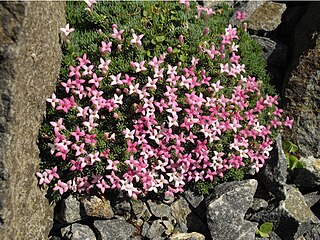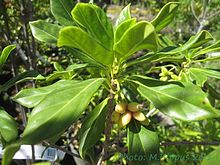
Uncaria is a genus of flowering plants in the family Rubiaceae. It has about 40 species. Their distribution is pantropical, with most species native to tropical Asia, three from Africa and the Mediterranean and two from the neotropics. They are known colloquially as gambier, cat's claw or uña de gato. The latter two names are shared with several other plants. The type species for the genus is Uncaria guianensis.
Stenostomum aromaticum, synonym Antirhea aromatica, is a species of plant in the family Rubiaceae. It is endemic to eastern Mexico. It is an endangered species, threatened by habitat loss.
Stenostomum jamaicense, synonym Antirhea jamaicensis, is a species of plant in the family Rubiaceae. It is endemic to Jamaica.
Stenostomum radiatum, synonym Antirhea radiata, is a species of plant in the family Rubiaceae. It is found in Cuba and Haiti. It is threatened by habitat loss.

Exostema is a genus of flowering plants in the family Rubiaceae. It consists of trees and shrubs, endemic to the neotropics, with most of the species occurring in the West Indies.

Gaertnera is a genus of flowering plants in the family Rubiaceae. There are at least 85 species distributed across the Old World tropics from Africa to Asia.

Spermacoce or false buttonweed is a genus of flowering plants in the family Rubiaceae. It comprises about 275 species found throughout the tropics and subtropics. Its highest diversity is found in the Americas, followed by Africa, Australia and Asia.

Crucianella is a genus of flowering plants in the family Rubiaceae. The species are annual herbs found from the Mediterranean to Central Asia and the Arabian Peninsula. One species is naturalized in northern California, southern Oregon, and Idaho.

Atractocarpus is a genus of flowering plants in the family Rubiaceae. Its members are commonly known as native gardenias in Australia. The genus name is derived from the Ancient Greek terms atractos "spindle", and karpos "fruit", from the spindle-shaped fruit of the type species.

Guettardeae is a tribe of flowering plants in the family Rubiaceae and contains about 748 species in 14 genera. Its representatives are widespread geographically and are found in the tropics and subtropics.
Rhaphidura lowii is a species of plant in the family Rubiaceae, the sole species in the monotypic genus Rhaphidura. It is endemic to Borneo, where is known only from Sarawak state. It is tentatively placed in the tribe Urophylleae, but was not included in a 2011 molecular phylogenetic study of that tribe.
Xantonneopsis is a genus of plants in the family Rubiaceae. It contains only one known species, Xantonneopsis robinsonii, native to Vietnam. The genus has been placed in the tribe Coffeeae, but a transfer from that tribe to Octotropideae was suggested in 2007 on the basis of combined molecular and morphological evidence.
Phylohydrax is a genus of plants in the family Rubiaceae. Its species are native to Madagascar, Tanzania and South Africa.

Kelloggia is a plant genus in the bedstraw and madder family, Rubiaceae. Its two species have a discontinuous distribution; one species is native to Bhutan and China, the other to the western United States.
Leptopetalum is a genus of flowering plants in the family Rubiaceae. The genus is widespread in tropical and subtropical Asia and the Pacific.

Asperula sintenisii is a species of flowering plant in the family Rubiaceae.
Stenostomum is a genus of flowering plant in the family Rubiaceae, native from southern Mexico to tropical South America. The genus was established by Karl Friedrich von Gaertner in 1806.









